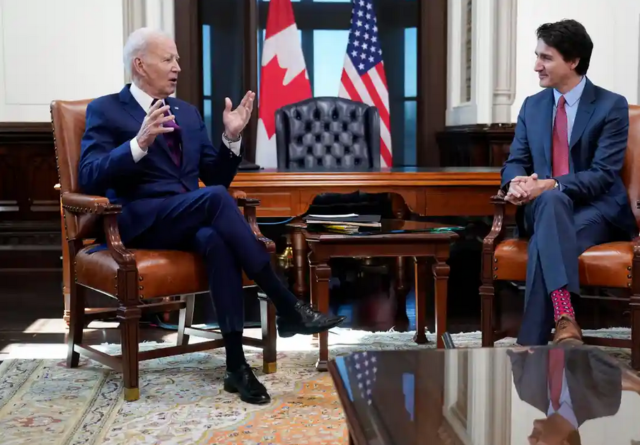After meetings with Joe Biden in Ottawa on Friday, Justin Trudeau’s administration announced a significant change in how Canada and the US handle asylum claims. This action effectively closes a contentious border crossing. Under the agreement, Canada would send in 15,000 extra South and Central American migrants, which Canadian officials hope will reduce the rise in unauthorised border crossings in recent months. The agreement would ensure more “fairness” in migration between the two countries, according to a statement from the prime minister’s office.
The two nations unveiled a number of new funding initiatives and policies on Friday, including the latest on illegal migration. Until 2004, asylum requests could be lodged at any authorised Canadian port of entry. If the request was granted, the applicant would then be allowed admission. The Safe Third Country Agreement, an agreement that required immigrants to file for asylum in the nation where they first arrived, was passed after Ottawa successfully advocated for its adoption. Land-based ports of entry are covered under the existing agreement, but irregular or unauthorised crossings are not.
Tens of thousands of migrants have disregarded the deal in recent years and requested asylum in unrecognised locations along the 5,500-mile US-Canada border. Officials are now able to turn away migrants attempting to cross at unauthorised border points because the agreement has been expanded to cover the whole border. Although Canada was a major proponent of the agreement in 2004, it has angered immigration officials recently due to an increase in asylum requests at the Quebec-New York border. At Roxham Road, an informal border crossing in the upstate New York forests, around 40,000 people crossed into Canada in the previous year. The bridge has generated political controversy in recent months, with calls for its closure coming from opposition figures and the government of Quebec.
Modifications to the agreement only need to be made by executive order and do not need congressional approval, so they could go into effect right away. The agreement is anticipated to go into effect shortly after midnight, according to Radio Canada of the CBC. A succession of fatalities among people making erroneous crossings in the icy winter months has also prompted calls for an overhaul. However, the decision to change the agreement, which Trudeau government officials have been pushing for, has sparked worries that by discouraging overt border crossings, desperate asylum seekers may turn to more covert and perilous crossings, as is all too frequently the case at the US-Mexico border.
Later in the day, Biden spoke to parliamentarians, former prime ministers, and a variety of other guests in front of the Canadian parliament. Biden commended the nations’ long-standing collaboration and common principles, which include those of labour unions. He explained to the large crowd there that the two nations were “two people” who “share one heart.”









